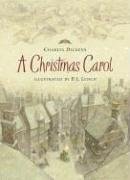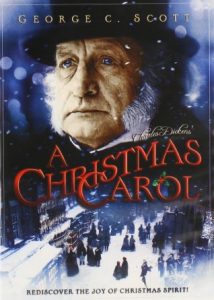 Charles Dickens, unlike other great authors like Herman Melville, had the good fortune of enjoying widespread fame and popularity during his lifetime. A Christmas Carol appeared on the upswing of his fame, written in six weeks during the autumn of 1843 and published that same year, on December 17. It was an instant classic, not just because of Dickens’ growing fame, but because his story capitalized on current trends, such as concern for the poor and an interest in old English holiday customs. Dickens was a child of the Industrial Revolution who had experienced first-hand the displacement and exploitation it brought about. Life on the underside is a consistent theme in his novels, particularly poignant in A Christmas Carol.
Charles Dickens, unlike other great authors like Herman Melville, had the good fortune of enjoying widespread fame and popularity during his lifetime. A Christmas Carol appeared on the upswing of his fame, written in six weeks during the autumn of 1843 and published that same year, on December 17. It was an instant classic, not just because of Dickens’ growing fame, but because his story capitalized on current trends, such as concern for the poor and an interest in old English holiday customs. Dickens was a child of the Industrial Revolution who had experienced first-hand the displacement and exploitation it brought about. Life on the underside is a consistent theme in his novels, particularly poignant in A Christmas Carol.
As everybody knows, the story turns on the conversion of Ebenezer Scrooge, over the course of one night, from a cold-hearted miser to an enthusiastic benefactor of those less fortunate than he. What may be overlooked, when the family gathers for its traditional viewing of one of the dozens of film adaptations, is that this is a purely secular conversion.
 Secular? What about the frequent allusions to church and the Christ child, and Scrooge’s resolution to honor Christmas in his heart, and Tiny Tim’s closing benediction, “God bless us, every one”? That was society at the time: England was in its post-Wesleyan revival. In the late 1700s, London was a cesspool of vice and libertinism, a corruption which spread throughout the nation. The preaching of the Wesleys and the influence of Evangelical groups like Wilberforce’s Clapham Sect had pushed England to clean up its act. By the 1840s, however, revivalism was aging to moralism, accompanied by a prim and ultimately deadly prudishness associated with Queen Victoria. England never recovered the level of biblical Christianity experienced in the early 1800s.
Secular? What about the frequent allusions to church and the Christ child, and Scrooge’s resolution to honor Christmas in his heart, and Tiny Tim’s closing benediction, “God bless us, every one”? That was society at the time: England was in its post-Wesleyan revival. In the late 1700s, London was a cesspool of vice and libertinism, a corruption which spread throughout the nation. The preaching of the Wesleys and the influence of Evangelical groups like Wilberforce’s Clapham Sect had pushed England to clean up its act. By the 1840s, however, revivalism was aging to moralism, accompanied by a prim and ultimately deadly prudishness associated with Queen Victoria. England never recovered the level of biblical Christianity experienced in the early 1800s.
By biblical standards, Dickens was not a Christian. He believed in God and dabbled in the spiritualism that was very popular in the 19th century, but his was a bootstrap religion: all of man’s problems could be solved by man himself with the right education and proper encouragement. Scrooge experiences a change of heart during his all-night confab with the three spirits, but it was one Dickens assumed any man could make after getting some sense and compassion knocked into him. A Christian holiday, with its themes of giving and Good Will Towards Men, made a perfect setting for Scrooge to see the light. In fact, it’s the refracted glow of Christian faith that he sees. But Christ Himself has no part in it. Scrooge realizes that he’s been a scrooge, not a hopeless sinner from birth. His change of heart will furnish Bob Cachit’s table, not deliver the Crachits from death to life. Likewise, the contemporary traditions of red kettles and secret Santas and baskets delivered to the needy are Christianity-driven impulses divorced from Christ and His life-changing demands.
It’s a terrific story, though. By all means, let’s drop our quarters in the Salvation Army kettle and buy the biggest turkey at Cost Cutters for the baskets they’re making up at the office. And gather the family for the annual viewing of A Christmas Carol. Dr. John Kwasny at ReelThinking.wordpress.com has a thoughtful “watch-along” guide with questions to think about while your favorite version rolls out on the screen. He’s graciously given us permission to re-post it, which we will do in a few days. It will give you plenty of food for thought to munch along with the popcorn, so stay tuned!
This post has stirred up my thoughts, so I may come back later with a meditation on what “keeping Christ in Christmas” really means. If you have any ideas along that line, or about A Christmas Carol, please share!
We have a lovely illustrated version of A Christmas Carol on our 2016 Winter Book Fair list!
Support our writers and help keep Redeemed Reader ad-free by joining the Redeemed Reader Fellowship.
Stay Up to Date!
Get the information you need to make wise choices about books for your children and teens.
Our weekly newsletter includes our latest reviews, related links from around the web, a featured book list, book trivia, and more. We never sell your information. You may unsubscribe at any time.
We'd love to hear from you!
Our comments are now limited to our members (both Silver and Golden Key). Members, you just need to log in with your normal log-in credentials!
Not a member yet? You can join the Silver Key ($2.99/month) for a free 2-week trial. Cancel at any time. Find out more about membership here.
1 Comments
Leave a Comment
You must be logged in to post a comment.


Looking forward to watching (Patrick Stewart is a great Scrooge!) along with Kwasny’s guide. We also love the audiobook version read by Jim Dale!